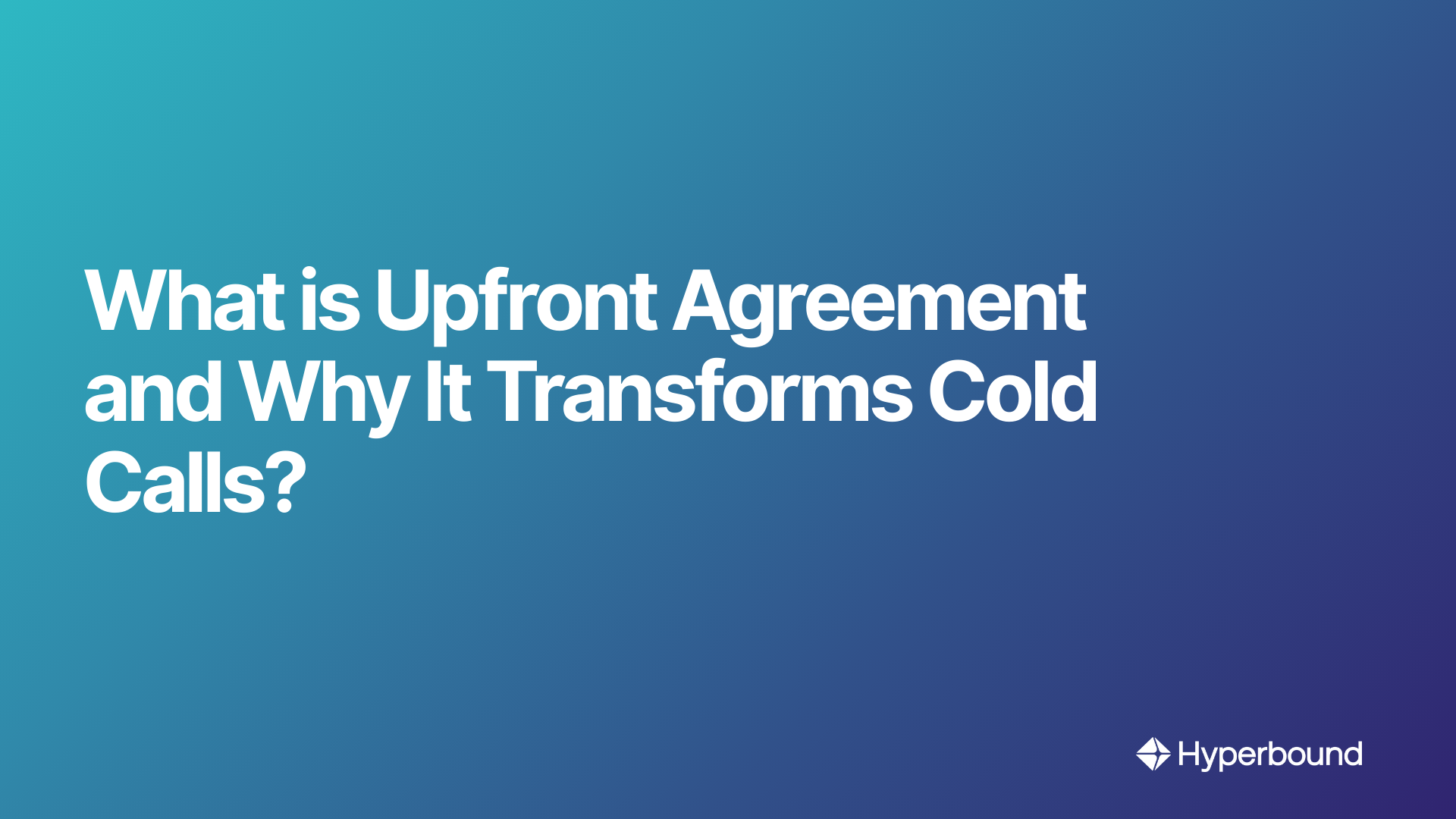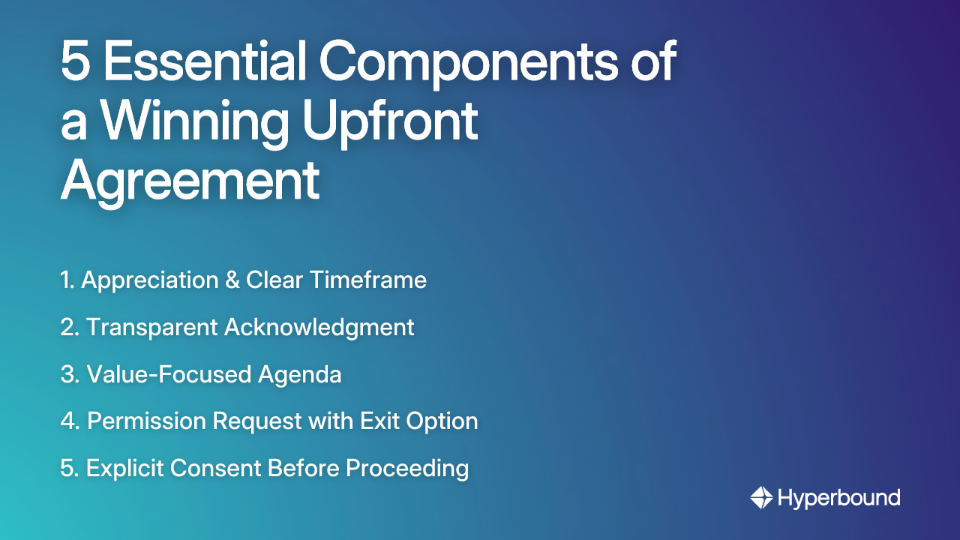
You're on your fifth cold call of the day. Your palms are sweaty, heart racing as you wait for the prospect to pick up. When they answer, you launch into your rehearsed pitch, speaking too quickly and sounding robotic. Within seconds, you hear the dreaded phrase: "Sorry, I don't take cold calls" – followed by the click of the receiver.
Sound familiar?
As an SDR or sales professional, you've likely experienced this soul-crushing cycle that makes cold calling feel like an uphill battle. The awkward first 15 seconds, the feeling of being just another salesperson working through a list, the constant rejection – it all adds up to make cold calling one of the most dreaded activities in sales.
But what if there was a simple technique that could transform these painful encounters into productive conversations? A method that respects your prospect's time while dramatically increasing your success rate?
The Game-Changing Power of the Upfront Agreement
An Upfront Agreement (sometimes called an Upfront Contract or UFC) is a verbal agreement made at the beginning of a sales conversation that clearly outlines the purpose, agenda, and potential outcomes of the call before diving into any business discussion.
Unlike the traditional cold calling approach where salespeople immediately launch into their pitch (what some call the "pitchslap"), the Upfront Agreement creates a foundation of transparency and respect that changes the entire dynamic of the conversation.
In its simplest form, it sounds like this:
"Hi John, this is Sarah from XYZ Company. I know you weren't expecting my call today. Would it be okay if I took just 60 seconds to explain why I'm calling, and then you can decide if it makes sense to continue the conversation? If not, I'll respect your time and let you go."
This approach might seem counterintuitive – you're essentially giving the prospect permission to hang up! But that's precisely what makes it so effective. By acknowledging that you're interrupting their day and giving them control over the conversation, you immediately differentiate yourself from the typical cold caller and lower their defenses.
Why Upfront Agreements Transform Cold Calls

1. They Eliminate "Mutual Mystification"
One of the biggest problems in cold calling is what sales experts call "mutual mystification" – when both the salesperson and the prospect are unsure about the purpose or next steps of the conversation. This confusion leads to awkwardness, mistrust, and ultimately, failed calls.
An Upfront Agreement eliminates this problem by ensuring both parties know exactly what's happening from the start.
2. They Build Instant Trust Through Transparency
According to research cited by HyperBound.ai, 66% of customers trust companies that are transparent, and 60% rank transparency as the most important brand trait. By being upfront about your intentions, you immediately position yourself as trustworthy.
This addresses a common pain point expressed by sales professionals on Reddit: "the less I feel like I'm working a job for a salary and this is the next call on a list, the more success I tend to have." The Upfront Agreement allows you to be authentic rather than robotic.
3. They Reduce Resistance by Giving Control
The Federal Trade Commission's guidance on telemarketing notes that people are "more inclined to listen to a pitch when they have agreed to hear it." By asking for permission, you give the prospect control, which paradoxically makes them more likely to listen.
This simple shift in approach is remarkably effective for objection handling before objections even arise.
4. They Function as a Powerful Pattern Interrupt
Most decision-makers are conditioned to immediately shut down cold calls. The Upfront Agreement acts as a pattern interrupt, breaking this automatic response by offering something unexpected: honesty and respect for their time.
The Anatomy of an Effective Upfront Agreement

A well-crafted Upfront Agreement consists of several key components:
1. Appreciation and Time Setting
Start by thanking the prospect for taking your call and setting clear expectations about the call's duration:
"Thanks for taking my call, Sarah. I know I've caught you in the middle of your workday."
2. Transparency About the Call's Nature
Acknowledge that this is a cold call rather than pretending you have an existing relationship:
"Full transparency, this is a cold call, but I believe there's a good reason for us to speak."
3. Clear Agenda and Value Proposition
Clearly state what you want to discuss and the potential value for the prospect:
"I'd like to take just 60 seconds to share how we're helping companies like yours reduce onboarding time by 40%, and then get your perspective on whether this might be relevant for your team."
4. Permission Request and Exit Option
Ask for permission to proceed and offer an easy way out:
"If it doesn't sound relevant, just say so, and I'll get out of your hair. If it does, we can schedule a proper discovery call. Does that sound fair?"
5. Mutual Consent
Wait for a clear "yes" before proceeding. Without explicit agreement, the contract isn't established.
Upfront Agreement Scripts That Actually Work
The best way to master the Upfront Agreement is to see it in action across different scenarios. Here are some proven scripts you can adapt for your cadences and A/B testing:
For Software/SaaS Sales SDRs
"Hi [Name], this is [Your Name] from [Company]. I know you weren't expecting my call today, and I promise to be brief. We've been working with companies like [Competitor/Similar Company] to [specific benefit with metrics if possible]. I'd like to take 30 seconds to explain how we might help [Prospect's Company] achieve similar results, and you can decide if it's worth a longer conversation. If not, I'll respect your decision and let you go. Would that be okay?"
For B2B Service Providers
"Hello [Name], I'm [Your Name] with [Company]. This is a cold call, but I've done my homework on [Prospect's Company]. We specialize in helping businesses in [industry] overcome [specific challenge]. Could I take just a minute to share a specific idea about how we might help you [achieve specific outcome], and then you can decide if it makes sense to talk further? Fair enough?"
For Financial Services
"Hi [Name], this is [Your Name] from [Company]. I'm reaching out because we've recently helped several [industry/role] professionals like yourself [specific benefit, e.g., 'reduce tax liability by an average of 12%']. I'd like to take 45 seconds to explain how this might apply to your situation, and then you can decide if it's worth exploring. Would that be alright with you?"
The Humor Approach
Some sales professionals find that a touch of humor can be effective. As one Reddit user suggested: "I make a joke out of the fact that yes, I am indeed cold calling them."
Try this: "Hi [Name], this is [Your Name] from [Company]. Yes, I know—who is this stranger calling you out of the blue? I promise I'm not trying to sell you extended car warranty! Could I take just 30 seconds to explain why I actually called, and then you can decide if it's worth continuing or if I should disappear forever?"
The Mini Upfront Contract
For situations where you need a quick permission request, try this streamlined version:
"Maybe if I just take thirty seconds to explain what our solution does and how I think it relates to your business, you can make a decision on whether it's worth continuing our discussion—and if it's not, that's absolutely fine. Would that work for you?"
Common Pitfalls to Avoid with Upfront Agreements
Even with this powerful technique, there are several traps that can undermine your success:
1. Using Inauthentic Pleasantries
Avoid opening with generic questions like "How are you today?" These ring false on a cold call and immediately signal that you're following a script. As noted by HyperBound.ai, such pleasantries can actually erode trust rather than build it.
2. Making Vague Claims
Your value proposition needs to be specific and ideally backed by proof. Vague statements like "We help companies improve their operations" won't create interest. Instead, try "We've helped three companies in your industry reduce operational costs by 22% within 90 days."
3. Using Manipulative Tactics
The Upfront Agreement is built on honesty and respect. Using high-pressure tactics or creating false urgency contradicts this foundation and will likely backfire. Solution selling depends on trust, not manipulation.
4. Failing to Listen After Agreement
Once you get permission to continue, many salespeople make the mistake of launching into a monologue. Remember that the agreement is for a conversation, not a one-sided presentation. Pay attention to the prospect's responses and adapt accordingly.
5. Giving Up Too Easily on "No"
When a prospect declines your Upfront Agreement, don't simply hang up. As one sales professional on Reddit advised: "If they answer no, don't hang up, stay friendly, sound disappointed and ask for more info."
Try pivoting with: "I understand. Would it be better if I sent some information via email that you could review when convenient? Or perhaps there's someone else on your team who handles these decisions?"
This approach maintains a positive relationship and opens the door for future follow-up strategy.
Implementing Upfront Agreements in Your Sales Process
To successfully integrate Upfront Agreements into your cold calling approach:
- Practice Until It's Natural: The language should feel conversational, not scripted. Practice with colleagues until it flows naturally. Using a platform like Hyperbound's AI Sales Roleplays can accelerate this process, allowing reps to practice in a safe, repeatable environment without risking live deals.
- Customize for Your Industry: Adapt the examples provided to reflect your specific value proposition and typical prospect challenges.
- Test Different Variations: Conduct A/B testing with different phrasings to find what works best for your particular audience and offering.
- Track Results: Monitor how Upfront Agreements affect your key metrics—connection rate, conversion to meetings, and ultimately, lead generation success.
- Refine Your Approach: Use the data from your tests to continuously improve your Upfront Agreement script and delivery.
From Cold Call to Warm Conversation
The Upfront Agreement transforms cold calling from a dreaded task into an opportunity for genuine connection. By leading with transparency, respecting your prospect's time and agency, and clearly communicating value, you shift the entire dynamic of the conversation.
As one sales professional noted on Reddit: "Do not have any doubts in your voice during the intro, you should sound as if they should be expecting your call!" The Upfront Agreement gives you the confidence to approach calls this way because you're no longer trying to trick or pressure anyone—you're simply offering value and respecting their right to decide.
When done correctly, this approach addresses the most common objections before they arise, reduces the awkwardness of the first 15 seconds, and creates a foundation for productive discovery questions and solution selling.
The next time you pick up the phone for a cold call, try leading with an Upfront Agreement. You might be surprised at how quickly it transforms the conversation from a tense sales pitch into a collaborative discussion about how you might help solve a genuine business problem.
After all, the goal isn't just to get through more calls—it's to have more meaningful conversations that lead to valuable relationships and, ultimately, successful deals. The Upfront Agreement is your first step toward making that happen.
Frequently Asked Questions
What is an Upfront Agreement in sales?
An Upfront Agreement is a verbal contract made at the beginning of a sales call that outlines the conversation's purpose, agenda, and potential outcomes. It's a technique used to establish transparency and mutual understanding before diving into a sales pitch, ensuring both the salesperson and the prospect know what to expect.
Why is the Upfront Agreement method effective for cold calls?
The Upfront Agreement method is effective because it immediately builds trust and lowers the prospect's natural resistance. By acknowledging the interruption, giving the prospect control over the conversation, and being transparent about your intentions, you differentiate yourself from typical high-pressure salespeople and create a more respectful and productive dialogue.
How do you start a cold call with an Upfront Agreement?
You can start a cold call with an Upfront Agreement by acknowledging the unexpected nature of the call and asking for a specific, short amount of time. For example: "Hi [Name], this is [Your Name]. I know you weren't expecting my call. Would it be okay if I took 60 seconds to explain why I'm calling, and then you can decide if it makes sense to continue?"
What should you do if a prospect says "no" to an Upfront Agreement?
If a prospect says "no," you should respect their decision without immediately ending the call. Maintain a friendly tone and pivot by asking if there's a better time to connect or if you can send information via email. This approach keeps the door open for future contact and maintains a positive impression.
How long should the pitch part of an Upfront Agreement be?
The initial pitch following an Upfront Agreement should be very brief, typically between 30 to 60 seconds. The goal is not to deliver a full presentation but to share a concise, high-impact value proposition that piques the prospect's interest and makes them agree that a longer conversation is worthwhile.
Can Upfront Agreements sound too scripted or robotic?
Yes, they can sound robotic if not practiced. The key is to internalize the structure—appreciation, transparency, agenda, and permission—and adapt the language to your natural speaking style. Practicing with colleagues or using AI roleplay tools helps you deliver the agreement conversationally and authentically, rather than reading from a script.
Is an Upfront Agreement only for cold calls?
No, the principle of the Upfront Agreement can be used in any sales interaction, not just cold calls. It is highly effective at the start of discovery calls, demo meetings, and even in follow-up emails to set clear expectations, establish an agenda, and ensure all parties are aligned on the purpose and potential outcomes of the conversation.

Book a demo with Hyperbound
.png)













